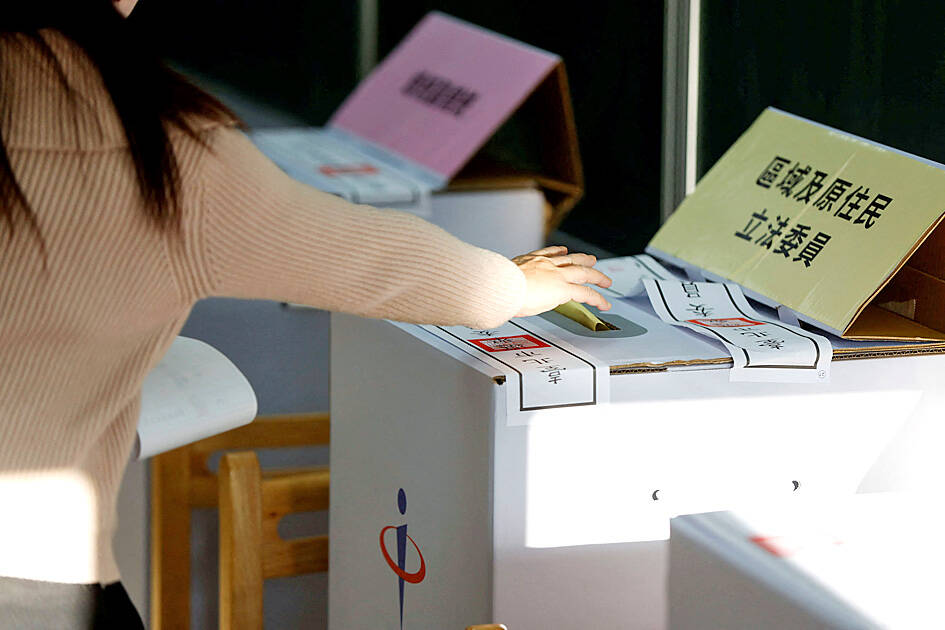The Central Election Commission (CEC) yesterday said the removal of “repeated signatures” from recall vote petitions was done according to the law, not due to forgery.
The CEC on Friday announced that the recall motions targeting 24 Chinese Nationalist Party (KMT) legislators and suspended Hsinchu Mayor Ann Kao (高虹安) have passed its review.
It also published the results of its review of recall petition signatures, including a statistical table that lists the types of invalid signatures in each recall motion, such as ineligible age, ineligible length of residence in the electoral district, “death before signing” and repeated signing.

Photo: Carlos Garcia Rawlins, Reuters
Invalid signature types also include phase two petitioners already being phase one proposers, having a wrong or unclear name, a wrong or unclear address, missing or wrong identification number, unclear name stamp or no signature, and forgery.
KMT caucus deputy secretary-general Chen Yu-jen (陳玉珍) yesterday said that according to the Civil Servants Election and Recall Act (公職人員選舉罷免法), proposers of recall motions during the first phase may not be phase two petitioners.
The CEC’s review found there were many repeated signatures by proposers in phase two petitions for recalls against KMT legislators, up to thousands of signatures in some cases, she said.
With such a high repetition rate, although phase one proposers can come back to “re-sign” a phase two petition, it is more reasonable to suspect that the recall groups used the names and personal information of phase one proposers to fill in the phase two petitions, or even copied their signatures, Chen said.
Prosecutors previously searched the headquarters of local KMT chapters during its investigation into forged signatures or signatures of deceased people in recall motions targeting Democratic Progressive Party (DPP) lawmakers, so they should apply the same standards in investigating the civic groups that initiated recall motions against KMT lawmakers, she said.
The CEC yesterday said that if either forgery or signatures of deceased people were found, the commission has a duty to report it to prosecutors, in accordance with the Code of Criminal Procedure (刑事訴訟法).
There has been no differential treatment for such cases, and it is the same now, without any exceptions, the commission said.
The removal of repeated signatures is conducted according to the law, and is not associated with forgery, the CEC said, adding that it has always been done this way and it would continue to be so.
DPP Legislator Wang Ting-yu (王定宇) wrote on social media that most of the invalid signatures in the phase two petitions were repeated signatures by phase one proposers.
The civic groups that initiated the recalls did not know which signatures from phase one proposers would be removed during the first review, so they urged all phase one proposers to also sign the phase two petition, he said, adding that if they had been counted as a phase one proposer, their phase two petition signature would be deemed a “repeat signature” and would thus be invalid.
This is totally different from the KMT’s forgery issues, Wang said.

The Coast Guard Administration (CGA) yesterday said it had deployed patrol vessels to expel a China Coast Guard ship and a Chinese fishing boat near Pratas Island (Dongsha Island, 東沙群島) in the South China Sea. The China Coast Guard vessel was 28 nautical miles (52km) northeast of Pratas at 6:15am on Thursday, approaching the island’s restricted waters, which extend 24 nautical miles from its shoreline, the CGA’s Dongsha-Nansha Branch said in a statement. The Tainan, a 2,000-tonne cutter, was deployed by the CGA to shadow the Chinese ship, which left the area at 2:39pm on Friday, the statement said. At 6:31pm on Friday,

The Chinese People’s Liberation Army Navy’s (PLAN) third aircraft carrier, the Fujian, would pose a steep challenge to Taiwan’s ability to defend itself against a full-scale invasion, a defense expert said yesterday. Institute of National Defense and Security Research analyst Chieh Chung (揭仲) made the comment hours after the PLAN confirmed the carrier recently passed through the Taiwan Strait to conduct “scientific research tests and training missions” in the South China Sea. China has two carriers in operation — the Liaoning and the Shandong — with the Fujian undergoing sea trials. Although the PLAN needs time to train the Fujian’s air wing and

The American Institute in Taiwan (AIT) put Taiwan in danger, Ma Ying-jeou Foundation director Hsiao Hsu-tsen (蕭旭岑) said yesterday, hours after the de facto US embassy said that Beijing had misinterpreted World War II-era documents to isolate Taiwan. The AIT’s comments harmed the Republic of China’s (ROC) national interests and contradicted a part of the “six assurances” stipulating that the US would not change its official position on Taiwan’s sovereignty, Hsiao said. The “six assurances,” which were given by then-US president Ronald Reagan to Taiwan in 1982, say that Washington would not set a date for ending arm sales to Taiwan, consult

A Taiwanese academic yesterday said that Chinese Ambassador to Denmark Wang Xuefeng (王雪峰) disrespected Denmark and Japan when he earlier this year allegedly asked Japan’s embassy to make Taiwan’s representatives leave an event in Copenhagen. The Danish-language Berlingske on Sunday reported the incident in an article with the headline “The emperor’s birthday ended in drama in Copenhagen: More conflict may be on the way between Denmark and China.” It said that on Feb. 26, the Japanese embassy in Denmark held an event for Japanese Emperor Naruhito’s birthday, with about 200 guests in attendance, including representatives from Taiwan. After addressing the Japanese hosts, Wang